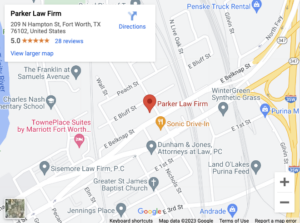Personal Injury Lawyer in Fort Worth TX Explains How Long You Have to File a Claim in Texas

A personal injury lawyer in Fort Worth TX can help if you’ve been injured in an accident and are wondering how long you have to file a claim. Understanding Texas’s legal deadlines is crucial, as missing them can prevent you from recovering compensation for medical expenses, lost wages, and other damages. In this article, we’ll break down the statute of limitations for personal injury cases in Texas, explain why meeting deadlines matters, and show how an experienced attorney can guide you through every step of the process.
Understanding the Statute of Limitations in Texas
The statute of limitations is the legal time limit for filing a lawsuit. In Texas, most personal injury cases must be filed within two years from the date of the injury.
The Statute of Limitations in Texas refers to the legally defined time period within which a person can file a lawsuit after an alleged event or injury. These time limits vary depending on the type of claim. For example, personal injury cases typically must be filed within two years from the date of the incident, while contract disputes may have a four-year limit.
This two-year period applies to many types of cases, including:
- Car accidents
- Truck accidents
- Slip-and-fall injuries
- Workplace injuries not covered by workers’ compensation
- Medical malpractice (with certain conditions)
Why is There a Deadline?
The law creates this time limit to:
- Ensure fairness by requiring claims to be filed while evidence and memories are still fresh.
- Provide certainty for defendants, preventing them from facing lawsuits decades later.
- Encourage injured individuals to pursue their rights without unnecessary delay.
Failing to meet this deadline typically results in dismissal of your case, no matter how strong your evidence may be.
Exceptions to the Standard Deadline
While the two-year rule is the general guideline, there are several important exceptions where the timeline can differ.
While the statute of limitations in Texas generally sets a strict deadline for filing lawsuits, there are several exceptions that may extend or toll (pause) the time limit. For instance, if the injured party is a minor, the statute of limitations may not begin until they reach the age of 18. Similarly, if the defendant hides their actions (fraudulent concealment) or leaves the state, the clock on the statute may be paused until they return.
Injuries Involving Minors
If the injured person is under 18, the statute of limitations may not begin until they reach adulthood. This means a minor injured in an accident may have until their 20th birthday to file.
Claims Against Government Entities
Suing a government agency requires much stricter timelines. In Texas, you must file a notice of claim within six months of the injury, and some cities require notice even sooner. This applies to cases such as injuries involving public transportation or unsafe government property.
The Discovery Rule
Not all injuries are immediately obvious. For example, complications from medical negligence may take months or even years to appear. In these situations, the statute of limitations may begin when the injury is discovered—or reasonably should have been discovered—rather than the date of the negligent act.
Each exception has its own complexities, which is why consulting a lawyer early is critical.
The Importance of Filing Your Personal Injury Claim on Time
- Why Missing the Deadline Can Impact Your Case
- Failing to file within the designated time period can result in your case being dismissed. The statute of limitations acts as a time limit, ensuring that claims are brought forward while evidence is still fresh and witnesses’ memories are reliable.
- If you miss this deadline, you lose the legal right to pursue compensation through the courts. Even if your case is strong, the court may refuse to hear it if the statute of limitations has expired.
- How the Statute of Limitations Protects Your Rights
- The statute of limitations exists to protect both plaintiffs and defendants. For plaintiffs, it ensures timely pursuit of justice, while for defendants, it prevents the possibility of defending claims based on stale evidence.
- It also helps keep the legal system efficient by limiting the number of cases that could be difficult to resolve after a long period of time.
Why Deadlines Matter for Personal Injury Cases
Deadlines are not just technicalities—they directly affect your ability to recover damages. Deadlines are crucial in personal injury cases because they determine whether you can seek compensation for your injuries. In Texas, if you miss the statute of limitations, you forfeit your right to file a lawsuit, no matter how strong your case is. The clock typically starts ticking from the date of the accident or the discovery of the injury.
Evidence Becomes Harder to Collect
Over time, witness memories fade, medical records may be misplaced, and physical evidence can deteriorate. Acting quickly allows your attorney to preserve vital details that strengthen your case.
Courts Enforce Statutes Strictly
Texas courts rarely make exceptions if the filing deadline passes. Even if your injuries are severe, missing the statute of limitations can result in a dismissal that ends your claim.
Insurance Companies Use Deadlines Against You
Insurance adjusters know the law. If they see you are close to the deadline—or have already missed it—they are far less likely to negotiate fairly. They may even delay communications to run down the clock.
How a Personal Injury Lawyer in Fort Worth TX Can Help
A personal injury attorney in Fort Worth provides more than just legal advice. They guide you step by step through the process, ensuring deadlines are met and your rights are fully protected.
A personal injury lawyer in Fort Worth, TX can provide invaluable assistance by guiding you through the complex legal process and ensuring that you meet all necessary deadlines. They can help you gather evidence, interview witnesses, and work with experts to build a strong case. A lawyer will also be familiar with Texas laws and local court procedures, which can increase the likelihood of a favorable outcome.
Key Roles of Your Lawyer
- Case evaluation – Determining whether you are within the statute of limitations.
- Evidence gathering – Preserving records, interviewing witnesses, and consulting experts.
- Negotiation – Dealing with insurance companies on your behalf.
- Litigation – Filing your case in court if settlement is not possible.
By working with a lawyer early, you gain peace of mind knowing your case is in good hands and that legal deadlines will not be missed.

Choosing the Right Personal Injury Law Firm
Not every firm approaches cases the same way. At Parker Law Firm Injury Lawyers, the focus is on providing each client with personalized representation and clear guidance about their rights.
The firm handles a wide range of personal injury cases in Fort Worth and surrounding areas, including motor vehicle accidents, wrongful death, and premises liability claims. What sets Parker Law Firm apart is its dedication to keeping clients informed and protecting them from being taken advantage of by insurers.
When considering a law firm, look for:
- Experience in Texas personal injury law.
- A track record of representing clients in Fort Worth.
- Transparent communication about the legal process.
Key Timelines for Filing Personal Injury Claims in Texas
Here’s a breakdown of some common deadlines:
| Type of CaseDeadline to File | File |
| General personal injury | 2 years from the date of injury |
| Injuries involving minors | Until age 20 (2 years after turning 18) |
| Claims against government entities | Notice required within 6 months |
| Discovery rule cases | From date injury was discovered |
These rules highlight why it’s vital to consult an attorney promptly—different circumstances can change the timeline significantly.
When the Clock Starts: Understanding Key Timeframes
- The Discovery Rule: When You Discover the Injury
- Typically, the statute of limitations in Texas begins to run from the date of the accident or injury. However, in some cases, the statute of limitations may start later, depending on when the injury was discovered.
- This is especially relevant in cases involving medical malpractice, toxic exposure, or injuries with delayed symptoms (e.g., some injuries from car accidents may not fully manifest until weeks or even months later).
- For instance, if you weren’t aware of an injury immediately after the accident, the “discovery rule” allows the statute of limitations to begin when you reasonably discover the harm, or should have discovered it with due diligence.
- Tolling the Statute of Limitations: Special Circumstances That Delay the Deadline
- Minors and Mental Incapacity: If the injured party is a minor (under 18) or is mentally incapacitated, the statute of limitations may be tolled, meaning it is paused until they reach a certain age or recover mental competence.
- Defendant’s Absence: If the defendant is out of state or cannot be located, the statute of limitations may be paused or tolled until they return to Texas or are found. This ensures that the defendant cannot evade responsibility simply by being absent.
- Ongoing Medical Treatment: In some cases, if the injured party is still undergoing treatment for their injuries, the clock may not start until the treatment ends or the injury reaches its maximum recovery point.
Steps to Take After an Accident
Understanding deadlines is only part of the equation. Taking the right actions immediately after an accident can significantly impact your case.
1. Seek Immediate Medical Care
Your health is the top priority. Visiting a doctor not only ensures you receive treatment but also creates documentation of your injuries.
2. Document the Scene and Gather Evidence
If possible, take photographs, save damaged property, and collect contact information from witnesses.
3. Report the Incident
Whether it’s a car accident or a workplace injury, reporting the event to the proper authorities strengthens your claim.
4. Contact a Lawyer Quickly
Speaking to a lawyer as soon as possible helps you avoid mistakes, protects you from aggressive insurance tactics, and ensures you don’t miss the statute of limitations.
Common Mistakes That Can Jeopardize Your Claim
When pursuing a personal injury claim, there are several common mistakes that can jeopardize your case. One of the biggest missteps is delaying medical treatment—not only can this affect your health, but it also weakens your claim by creating a gap in medical records. Another critical error is admitting fault or making statements that could be misinterpreted by insurance adjusters or opposing attorneys. Even when people know the statute of limitations, certain mistakes can harm their case:
- Waiting too long to seek medical treatment – Insurers may argue your injuries are not serious.
- Not keeping records – Losing receipts, bills, or medical records weakens your claim.
- Handling insurers alone – Adjusters may pressure you into settling for less than you deserve.
- Assuming exceptions apply – Relying on assumptions instead of legal advice can cause you to miss deadlines.
Avoiding these mistakes with the guidance of an attorney increases your chance of a successful outcome. To get more information about this you can also check this website.
Final Thoughts
Filing a personal injury claim in Texas comes with strict deadlines, most commonly a two-year statute of limitations. Exceptions exist, but they are complex and applied narrowly. Acting quickly not only preserves your right to file but also strengthens your case by keeping evidence fresh.
If you’ve been injured in Fort Worth or surrounding areas, the attorneys at Parker Law Firm are here to help. Protect your rights, safeguard your future, and contact us today.
The state generally provides a two-year window from the date of the incident to file a claim, but certain circumstances may affect this timeline. Missing this deadline could result in losing the opportunity to seek compensation for your injuries. A qualified attorney in Fort Worth can guide you through the process, ensuring all deadlines are met and maximizing your chances of a successful outcome. Time is of the essence, so don’t hesitate to get legal advice early to secure the best possible result for your case.
FAQs
Q1: What is the statute of limitations for personal injury in Texas?
Most cases must be filed within two years from the date of the injury.
Yes. Exceptions exist for minors, government claims, and injuries discovered later under the discovery rule.
The court may dismiss your case, and you could lose your right to compensation.
While it’s possible, working with an attorney ensures deadlines are met and your case is handled properly.
Acting early helps preserve evidence, strengthens your case, and ensures you don’t miss critical deadlines.


